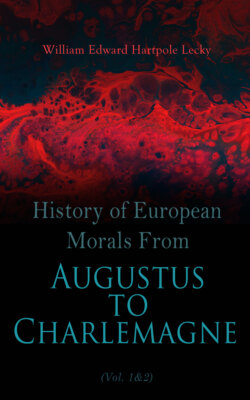History of European Morals From Augustus to Charlemagne (Vol. 1&2)

Реклама. ООО «ЛитРес», ИНН: 7719571260.
Оглавление
William Edward Hartpole Lecky. History of European Morals From Augustus to Charlemagne (Vol. 1&2)
History of European Morals From Augustus to Charlemagne (Vol. 1&2)
Table of Contents
Volume 1
Table of Contents
Preface
Chapter I. The Natural History Of Morals
Chapter II. The Pagan Empire
Chapter III. The Conversion Of Rome
Footnotes
Volume 2
Table of Contents
Chapter IV. From Constantine To Charlemagne
Chapter V. The Position Of Women
Footnotes
Отрывок из книги
William Edward Hartpole Lecky
Complete Edition
.....
The great work of Hartley expanding and elaborating these views was published in 1747. It was encumbered by much physiological speculation into which it is needless for us now to enter, about the manner in which emotions act upon the nerves, and although accepted enthusiastically by Priestley and Belsham, and in some degree by Tucker, I do not think that its purely ethical speculations had much influence until they were adopted by some leading utilitarians in the present century.46 Whatever may be thought of the truth, it is impossible to withhold some admiration from the intellectual grandeur of a system which starting from a conception of human nature as low and as base as that of Mandeville or Hobbes professes without the introduction of a single new or nobler element, by a strange process of philosophic alchemy, to evolve out of this original selfishness the most heroic and most sensitive virtue. The manner in which this achievement is effected is commonly illustrated by the passion of avarice. Money in itself possesses absolutely nothing that is admirable or pleasurable, but being the means of procuring us many of the objects of our desire, it becomes associated in our minds with the idea of pleasure; it is therefore itself loved; and it is possible for the love of money so completely to eclipse or supersede the love of all those things which money procures, that the miser will forego them all, rather than part with a fraction of his gold.47
The same phenomenon may be traced, it is said, in a multitude of other forms.48 Thus we seek power, because it gives us the means of gratifying many desires. It becomes associated with those desires, and is, at last, itself passionately loved. Praise indicates the affection of the eulogist, and marks us out for the affection of others. Valued at first as a means, it is soon desired as an end, and to such a pitch can our enthusiasm rise, that we may sacrifice all earthly things for posthumous praise which can never reach our ear. And the force of association may extend even farther. We love praise, because it procures us certain advantages. We then love it more than these advantages. We proceed by the same process to transfer our affections to those things which naturally or generally procure praise. We at last love what is praiseworthy more than praise, and will endure perpetual obloquy rather than abandon it.49 To this process, it is said, all our moral sentiments must be ascribed. Man has no natural benevolent feelings. He is at first governed solely by his interest, but the infant learns to associate its pleasures with the idea of its mother, the boy with the idea of his family, the man with those of his class, his church, his country, and at last of all mankind, and in each case an independent affection is at length formed.50 The sight of suffering in others awakens in the child a painful recollection of his own sufferings, which parents, by appealing to the infant imagination, still further strengthen, and besides, “when several children are educated together, the pains, the denials of pleasure, and the sorrows which affect one gradually extend in some degree to all;” and thus the suffering of others becomes associated with the idea of our own, and the feeling of compassion is engendered.51 Benevolence and justice are associated in our minds with the esteem of our fellow-men, with reciprocity of favours, and with the hope of future reward. They are loved at first for these, and finally for themselves, while opposite trains of association produce opposite feelings towards malevolence and injustice.52 And thus virtue, considered as a whole, becomes the supreme object of our affections. Of all our pleasures, more are derived from those acts which are called virtuous, than from any other source. The virtuous acts of others procure us countless advantages. Our own virtue obtains for us the esteem of men and return of favours. All the epithets of praise are appropriated to virtue, and all the epithets of blame to vice. Religion teaches us to connect hopes of infinite joy with the one, and fears of infinite suffering with the other. Virtue becomes therefore peculiarly associated with the idea of pleasurable things. It is soon loved, independently of and more than these; we feel a glow of pleasure in practising it, and an intense pain in violating it. Conscience, which is thus generated, becomes the ruling principle of our lives,53 and having learnt to sacrifice all earthly things rather than disobey it, we rise, by an association of ideas, into the loftiest region of heroism.54
.....